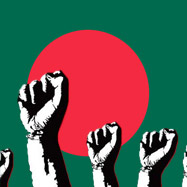Speech of the Prime Minister of India, Mrs. Indira Gandhi at a Public Rally in Dacca, 17 March 1972
“My heart overflows as I come to your beautiful country and to this historic ground. For many years, we had all heard of the beauty of Bangladesh. For many years, we had known about the agony you have suffered, and especially the fierce atrocities of last year. The story of your journey through darkness has moved the hearts of people and brought tears to the eyes wherever people value the human spirit.
- Indira Gandhi
- November 2021










